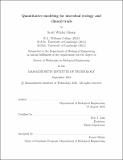Quantitative modeling for microbial ecology and clinical trials
Author(s)
Olesen, Scott Wilder
DownloadFull printable version (7.662Mb)
Other Contributors
Massachusetts Institute of Technology. Department of Biological Engineering.
Advisor
Eric J. Alm.
Terms of use
Metadata
Show full item recordAbstract
Microbial ecology has benefited from the decreased cost and increased quality of next-generation DNA sequencing. In general, studies that use DNA sequencing are no longer limited by the sequencing itself but instead by the acquisition of the samples and by methods for analyzing and interpreting the resulting sequence data. In this thesis, I describe the results of three projects that address challenges to interpreting or acquiring sequence data. In the first project, I developed a method for analyzing the dynamics of the relative abundance of operational taxonomic units measured by next-generation amplicon sequencing in microbial ecology experiments without replication. In the second project, I and my co-author combined a taxonomic survey of a dimictic lake, an ecosystem-level biogeochemical model of microbial metabolisms in the lake, and the results of a single-cell genetic assay to infer the identity of taxonomically-diverse, putatively-syntrophic microbial consortia. In the third project, I and my co-author developed a model of differences in the efficacy that stool from different donors has when treating patients via fecal microbiota transplant. We use that model to compute statistical powers and to optimize clinical trial designs. Aside from contributing scientific conclusions about each system, these methods will also serve as a conceptual framework for future efforts to address challenges to the interpretation or acquisition of microbial ecology data.
Description
Thesis: Ph. D., Massachusetts Institute of Technology, Department of Biological Engineering, 2016. This electronic version was submitted by the student author. The certified thesis is available in the Institute Archives and Special Collections. Cataloged from student-submitted PDF version of thesis. Includes bibliographical references.
Date issued
2016Department
Massachusetts Institute of Technology. Department of Biological EngineeringPublisher
Massachusetts Institute of Technology
Keywords
Biological Engineering.